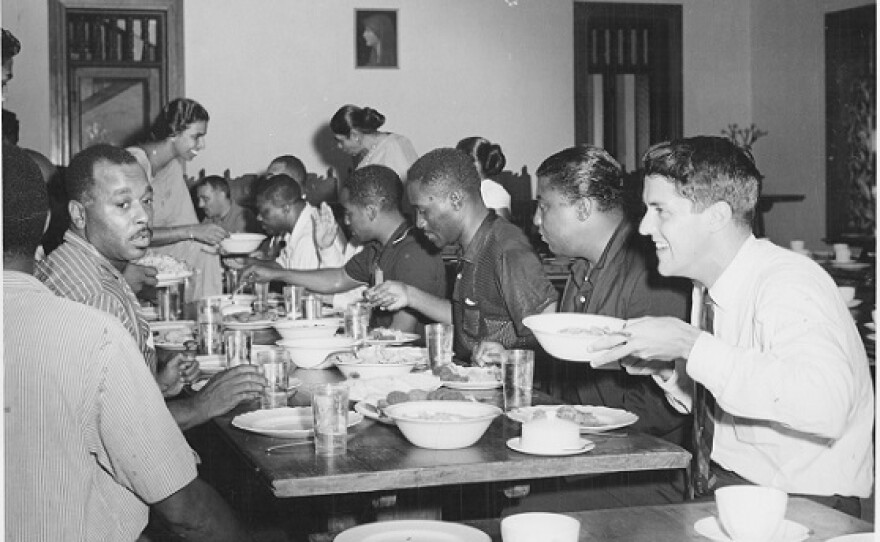During the Cold War, the U.S. Department of State sent jazz musicians around the world to sell the American way of life. This initiative took place in the 1950s, during segregation and the beginning of the civil rights movement. Jazz was gaining popularity on the international stage partly because of a Voice of America program hosted by Willis Conover, and partly because jazz musicians, like Louis Armstrong, played international tours.
The U.S. government took note of this popularity and decided to send musicians as representatives of the country, even as those representatives didn’t have the full benefits of the freedom they were touting. Many of these multi-racial, multi-gender groups were not allowed to perform within the boundaries of the United States due to Jim Crow.
Host Frank Stasio talks to Hugo Berkeley, director of the new documentary “The Jazz Ambassadors: The Untold Story of America’s Coolest Weapon in the Cold War.” Historian Adriane Lentz-Smith joins the conversation to put the story of the jazz ambassadors into context. Lentz-Smith is a professor of history at Duke University who served as an advisor to the documentary. She’s also the author of “Freedom Struggles: African Americans and World War I” (Harvard University Press/2011). “The Jazz Ambassadors” screens at the Full Frame Documentary Film Festival in Durham on Sunday, April 8.
Interview Highlights
Berkeley on what the United States tried to represent internationally versus what was really happening inside the country:
There was America's claim to lead the world as a democratic country, as a country with a rule of law. All the claims that it made in the Cold War were seemingly undercut by these headlines as the civil rights movement was gaining steam. The violent reaction to that was also becoming more evident. So people were reading about these outrages with increasing frequency in their newspapers. The stories were also being heavily promoted by the Soviet propaganda machine. The Soviets were very keen to make sure that they stayed in the headlines, so America had a big image problem.
If you send black soldiers out to fight fascism, then how do you even hold onto the term white supremacy in the United States? - Adriane Lentz-Smith
Berkeley on how jazz musicians dealt with the mission to tout American ideals while living in a segregated country:
What I discovered through making the film – and what to me is the really empowering part of this story – is that each of these musicians was able to find their own way of responding to this paradox … And I think within the context of the Cold War they were very patriotic. They believed that America presented a better way of life. I think on some level all of the musicians who I spoke to, and who I read about, believed that America was on a path to equality and civil rights reform that still had a ways to go. Yet they obviously had to go out there and tell the truth about their experience, and that is the really strong part of their response to the answer.
Lentz-Smith on the historical context of the jazz program:
You have to remember the first jazz tour is '56 or '57, and Brown v. Board, the Supreme Court order ordering desegregation of schools, is '54. The Bandung Conference of African and Asian countries in Indonesia is '55. So the two things that are happening in the context of this: the accelerating and intensifying civil rights struggle and decolonization — and with it the decisions that newly-independent states have to make about how they're going to position themselves within the contest between the U.S. and the Soviet Union.





